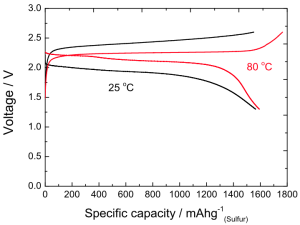
Voltage profiles of charge-discharge cycles of the Li/Li3PS4/S battery.
Image: Journal of The Electrochemical Society
A team from Japan’s Samsung R&D has worked in collaboration with researchers from the University of Rome to fabricate a novel all solid state Lithium-sulfur battery.
The paper has been recently published in the Journal of The Electrochemical Society. (P.S. It’s Open Access! Read it here.)
The battery’s capacity is around 1,600 mAhg⁻¹, which denotes an initial charge-discharge Coulombic efficiency approaching 99 percent.
Additionally, the battery possesses such beneficial properties as the smooth stripping-deposition of lithium. In contrast to other Li-S cells, the new battery’s activation energy of the charge transfer process is much smaller.
This from “All Solid-State Lithium-Sulfur Batter Using a Glass-Type P₂S₅-Li₂ Electrolyte: Benefits on Anode Kinetics“:
Overcoming the polysulfide shuttle is a significant advantage since it is a major drawback for a typical liquid electrolyte based Li-S battery. Further work is in progress in our laboratories to elucidate the behavior of our battery, and also to improve its construction. Nevertheless, we believe that the data here reported, even if still at a preliminary stage, are of importance for the progress of the lithium-sulfur battery technology.
Because of their high energy density, the Li-S battery is receiving much attention in the scientific community. Many are looking at the Li-S as a successor to the current lithium-ion technology. The new solid state Li-S battery is able to tackle many of the problems that the Li-ion faces, including dendrite deposition.
Solid-state electrolytes, based on both inorganic and organic compounds, are valid alternatives to develop lithium batteries with high safety and long cycle life, as in fact practically demonstrated. It is important to point out that these “solid-state batteries” have the favorable characteristic of avoiding lithium dendrite deposition and hence, of preventing short circuits, in cells using lithium metal as the anode active material. In addition, solid electrolytes are expected to be safer than common non-aqueous electrolyte media, because of their low or negligible vapor pressure.
The researchers state that these results support their theory that a dense solid electrolyte is the key for making high performance solid state batteries.
ECS publications span the entire subject area of electrochemistry and solid state science. Our flagship title, Journal of The Electrochemical Society, has been continuously published since 1902 and remains one of the most-highly cited in electrochemistry.
Find out more about publishing with us.
[Source: Green Car Congress]Takanobu Yamada, Seitaro Ito, Ryo Omoda, Taku Watanabe, Yuichi Aihara, Marco Agostini, Ulderico Ulissi, Jusef Hassoun, and Bruno Scrosati (2015) “All Solid-State Lithium–Sulfur Battery Using a Glass-Type P2S5–Li2S Electrolyte: Benefits on Anode Kinetics” J. Electrochem. Soc. 162(4): A646-A651

